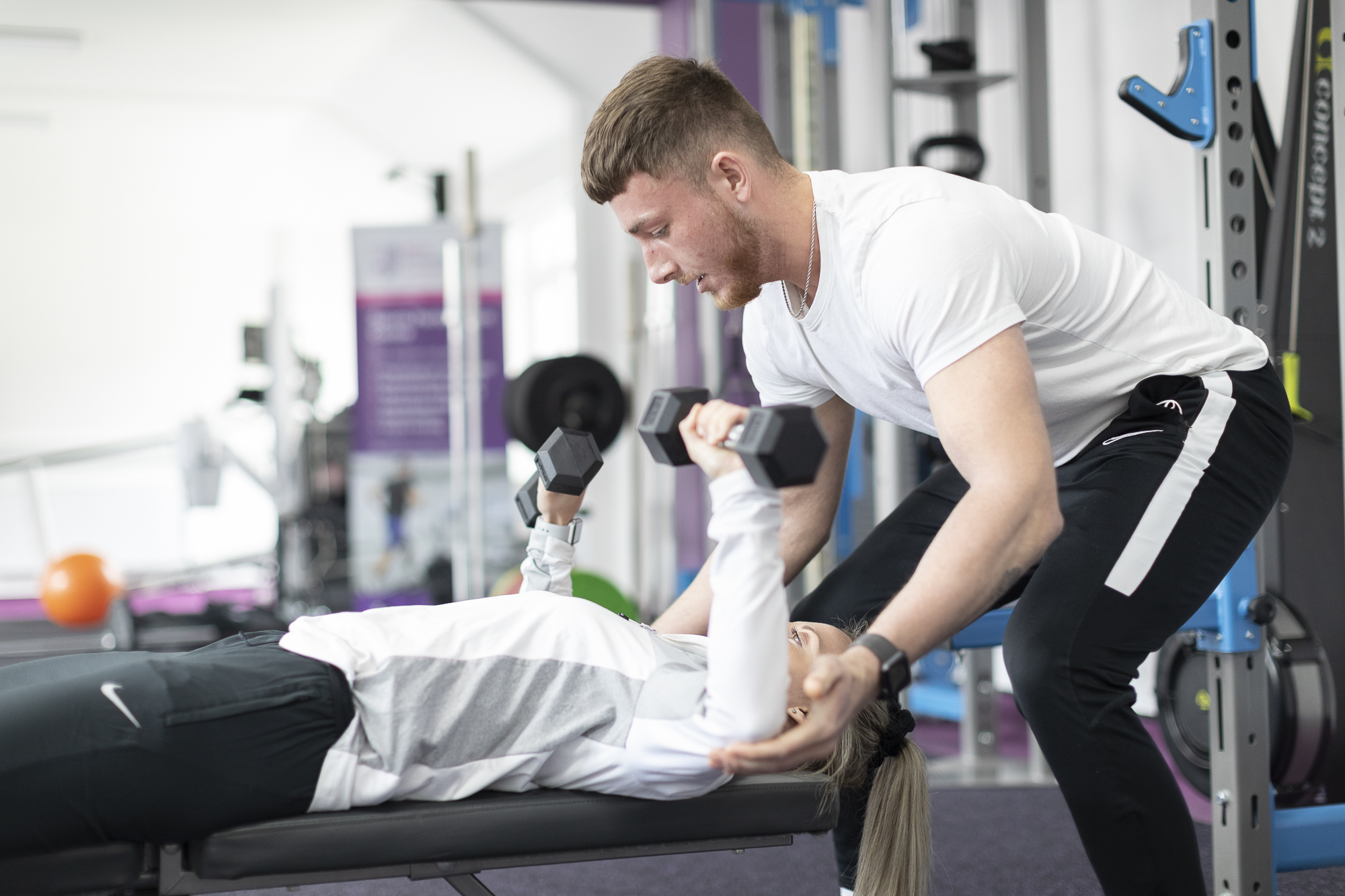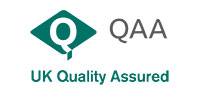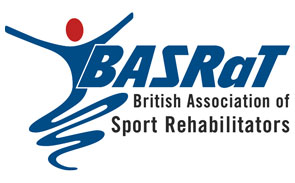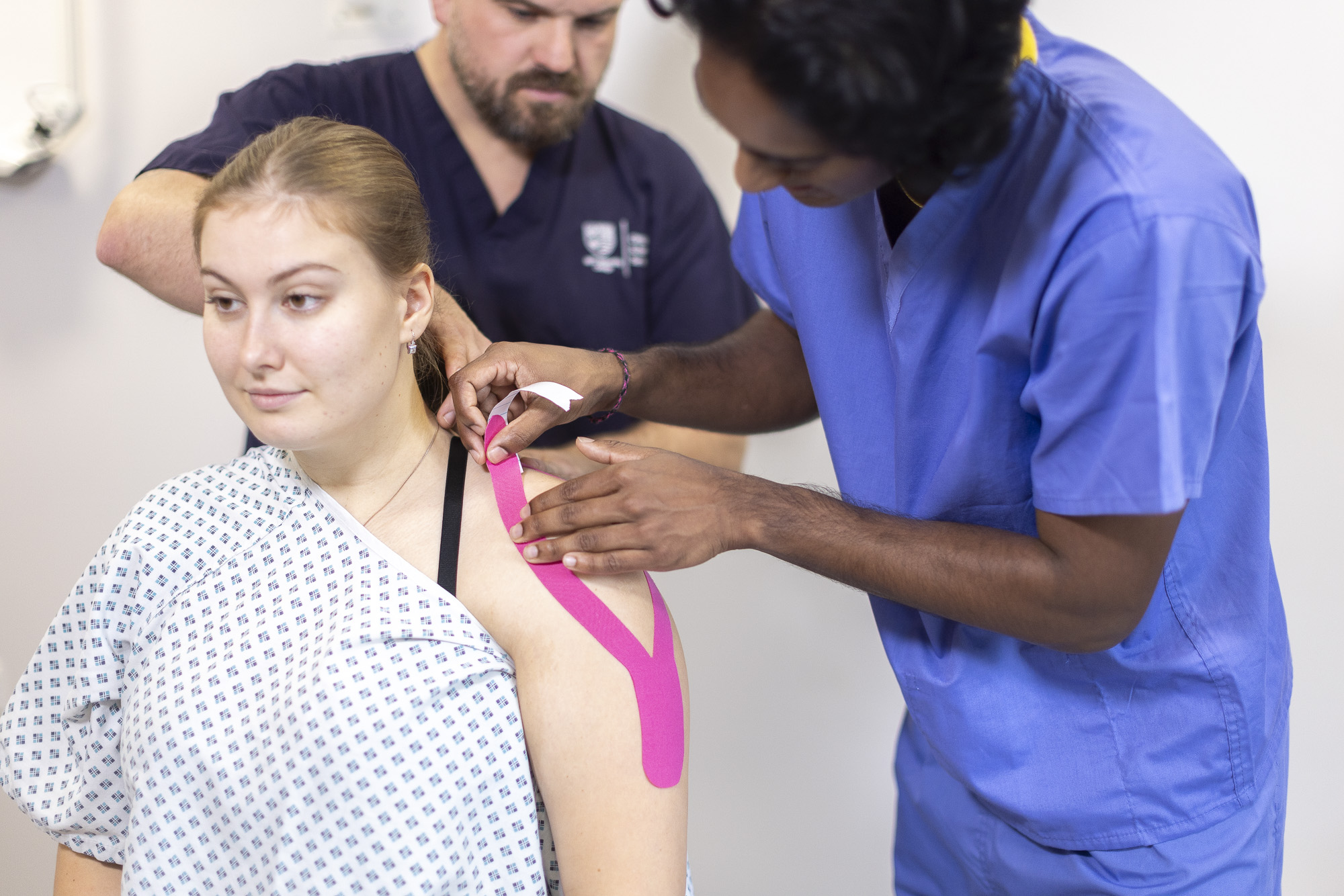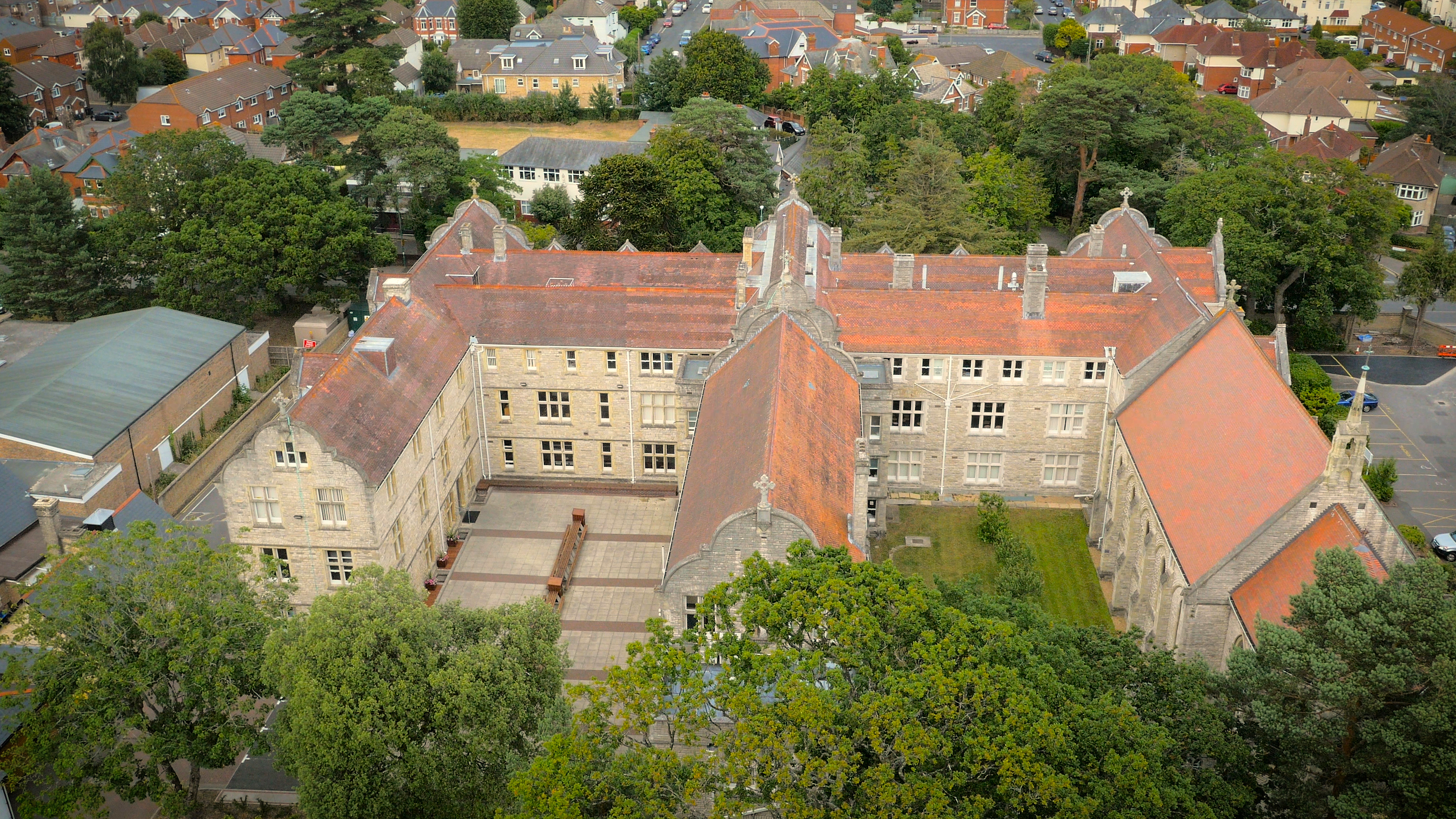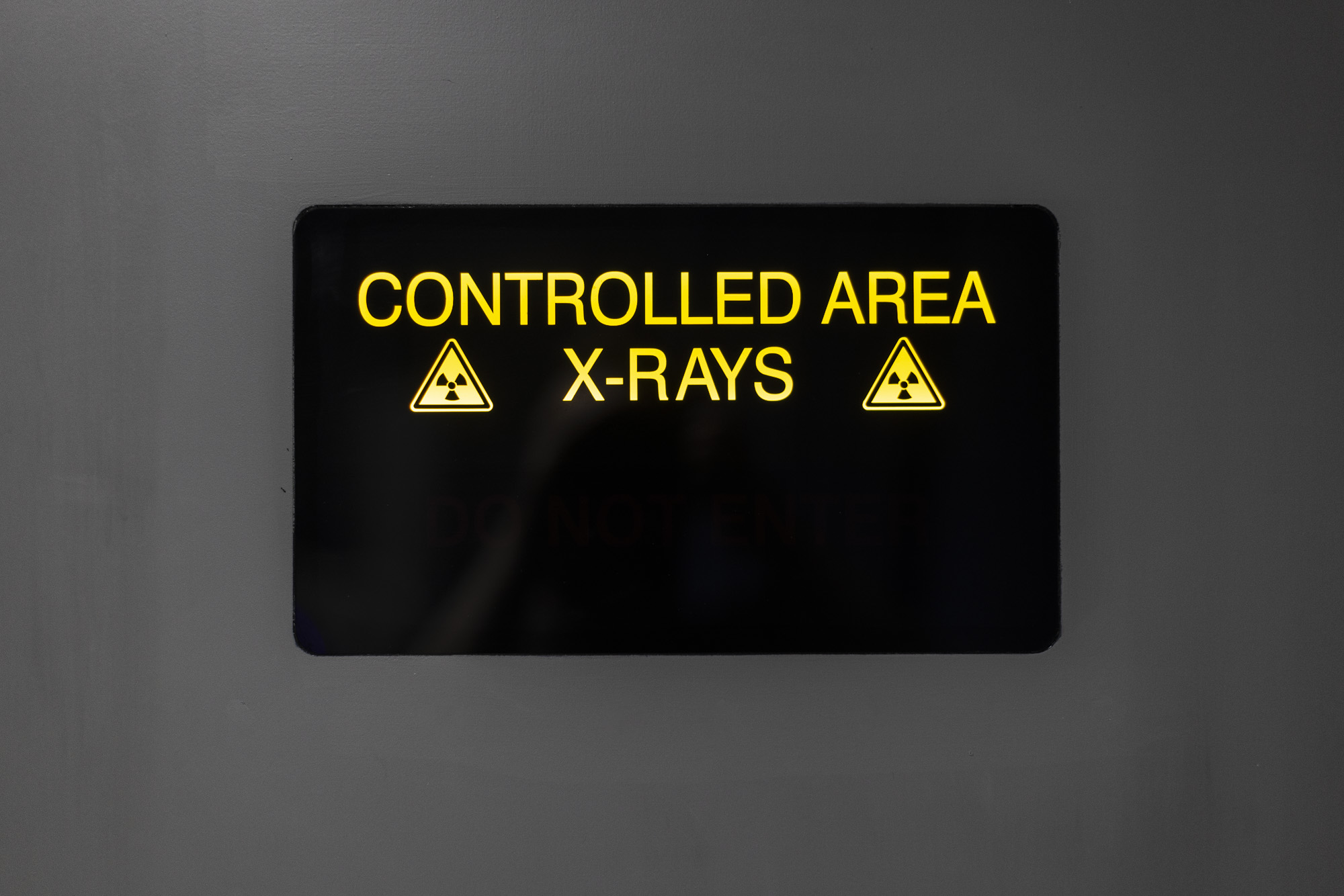Overview
This BASRaT-accredited course is the ideal way for students with a BA (Hons) in subjects such as Sports Therapy and Physical Education to take the next step towards a rewarding career as a sport rehabilitator.
You’ll develop a broad range of rehabilitation-focused skills and expertise ranging from soft tissue therapies to pitch-side first aid and injury recovery. You’ll also learn how to rehabilitate athletes back to full sports participation, as well as how to examine and assess injuries for diagnosis or referral.
The course is focused on getting you work-ready, so you’ll be taught professional skills and undertake a 400-hour clinical placement during your year with us.
You’ll have plenty of opportunity to develop hands-on skills at our state-of-the-art facilities which include onsite clinics, imaging services, treatment spaces and a pro-section laboratory. Assessment methods for the course are also highly contemporary – you’ll have the opportunity to write blogs and consultancy reports, produce short videos and engage with social media and debates, in addition to writing more traditional essays and dissertations.
Study Options
This course is now also being offered in London. Students can choose to study at Health Sciences University’s Bournemouth campus or with our expert team on Borough High Street in Central London.
Course Details
Why study for a MSc Sport Rehabilitation and Therapy (pre-registration) at Health Sciences University?
We offer an innovative curriculum designed to meet the needs of aspiring Sport and Exercise Rehabilitators. We have fantastic state-of-the-art healthcare education provision including onsite clinics, imaging services, treatment spaces and a pro-section laboratory. This coupled with our expertise in sport and exercise science, our Sports Performance Centre delivering sport science testing services, and the development of an on-site sport and performance injury clinic, offers a fantastic environment in which aspiring Sport and Exercise Rehabilitators can train and develop.
Structure of study with key unit highlights.
Structure of study, lectures, seminars, practical with key unit highlights.
We utilise a diverse range of delivery approaches to maximise learning in individual units. Delivery modes include: seminars, workshops, practice sessions, manual therapy and practice labs, placement opportunities peer and expert observations, online learning and laboratory sessions.
The course is currently delivered two days per week during term-time with practical face-to-face delivery. Students will be expected to undertake allocated work outside of these days during the week, equivalent of a further day per week. Students are encouraged to undertake additional self-directed learning into topics they find interesting outside structured hours.
How you will be assessed
The MSc Sport Rehabilitation and Therapy course utilises a range of contemporary approaches to assessing learning, whilst also seeking to develop key applied skills and communication approaches. So alongside more traditional dissertation and essay assessments students will also write blogs, produce short videos, engage with social media, write consultancy reports, engage in role plays and debates.
Need more info about, learning aims and outcomes, curriculum content, teaching methods and assessment, credits per unit? Take a look at our Course Specification to find out more.
For more information see our Course Specifications.
Placement
Students enrolled on this course must complete 400 hours of placement experience, as stipulated by BASRaT regulations.
Please note: students are responsible for covering their own transport costs to and from the placement sites.
Please see Additional Costs page for more information.
While the programme maintains connections with placement opportunities nearby, students may need to actively seek and secure placements independently. This could involve searching for placements locally or even in their place of residence, allowing students to find a suitable site that aligns with their preferences.
Important Information
BASRaT – (British Association of Sport Rehabilitators and Trainers)
The BASRaT accreditation of this course means graduates can, and often will go on to become BASRaT registered Sport’s Rehabilitators.
Please note: Eligibility for joining BASRaT is contingent on: holding a BASRaT Accredited degree or equivalent entry via the International Arrangement; obtaining a pass in the BASRaT registration exam; successfully completing a Trauma Care qualification endorsed by the faculty of pre-hospital care; and completion and submission of all other documentation in relation to Fitness to Practise.
Unit Breakdown
Principles of Sport and Exercise Rehabilitation 
Units
(Core Unit)
SEH7001 – Principles of Sport and Exercise Rehabilitation
In this unit you will develop an understanding of the practice of sport and exercise rehabilitation. You will consider the contemporary nature of sport and exercise rehabilitation practice and the development of clinical and practical skills relating to rehabilitation. You will also explore fundamental underpinning health science theory including functional anatomy, flexibility, physiology and biomechanics. There will also be the opportunity to explore the factors that contribute to sport injuries, the various approaches used in their management, and approaches to improve the athletes’ overall ability to return to optimal function and performance. Finally, you will evaluate the effectiveness of various multi-disciplinary management approaches used in sport rehabilitation programmes.
Clinical Assessment in Sport and Exercise 
Units
(Core Unit)
SEH7002 – Clinical Assessment in Sport and Exercise
This unit will prepare aspiring sport and exercise rehabilitators and healthcare practitioners to critically assess, treat, and make clinical decisions about sport and exercise service user care which may include working in a multi professional context. In this unit you will develop an in-depth understanding of relevant clinical assessment processes and procedures and develop your own skills in clinical assessment.
Supporting Disabled and Para Athletes 
Units
(Optional Unit)
SEH7003 – Supporting Disabled and Para Athletes
This unit will provide you with the opportunity to consider the complexities of working with disabled and para athletes of all levels. You will explore physiological, psychological and biomechanical support and testing for disabled and para athletes, as well as the influences of medical treatments on performance parameters. There will also be the opportunity to gain an understanding of classification systems and the process of classifying an athlete’s disability.
Please Note: May be subject to change
Muscle Injury Ultrasound 
Units
(Optional Unit)
SEH7004 – Muscle Injury Ultrasound
This unit will provide you with an opportunity to develop an understanding of muscle injury ultrasound. In particular, you will develop an understanding of the requirements for musculoskeletal practitioners in the safe use of diagnostic ultrasound imaging and in the competent interpretation of ultrasound reports and visualisations for upper and lower limb muscle conditions.
Please Note: May be subject to change
Cardiac Rehabilitation 
Units
(Optional Unit)
SEH7005 – Cardiac Rehabilitation
In this unit you will critically examine contemporary knowledge and best practice relating to the rehabilitation of a range of cardiac conditions. In the unit you will explore the factors that contribute to the development of coronary heart disease, the medication used in its treatment, and the implications for exercise prescription within cardiac patient groups. Finally, you will also evaluate the effectiveness of a range of cardiac rehabilitation programmes.
Please Note: May be subject to change
Rehabilitation of Neurological Conditions 
Units
(Optional Unit)
SEH7006 – Rehabilitation of Neurological Conditions
In this unit you will develop an understanding of the processes underpinning the rehabilitation of the most common neurological conditions. In particular, you will consider the most contemporary rehabilitation techniques based around the promotion of neuroplasticity and neural repair. You will also develop an understanding of the key features and symptoms of progressive and degenerative diseases, and sudden onset neurological conditions both in the acute and chronic phases. Finally, you will consider how exercise and physical activity can aid recovery.
Please Note: May be subject to change
Therapeutic Intervention and Manual Therapy 
Units
(Core Unit)
SEH7007 – Therapeutic Intervention and Manual Therapy
In this unit you will be introduced to a variety of manual therapy techniques and therapeutic interventions used in the treatment of soft tissue, peripheral joint and vertebral joint injuries and dysfunctions. You will also learn how to apply sport and remedial massage techniques using advanced soft tissue techniques in a safe and effective manner. Completion of this unit does not qualify the student to practice in Sports Massage outside of relevant professional registration.
Sports Injury Treatment Modalities 
Units
(Core Unit)
SHE7008 – Sports Injury Treatment Modalities
In this unit you will critically examine contemporary knowledge and best practice relating to the rehabilitation of a range of sports injuries. You will explore the factors that contribute to sports injuries, the various approaches used in their management and approaches to improve the athlete’s overall ability to return to optimal function and performance. You will also evaluate the effectiveness of various multidisciplinary management approaches used in sport rehabilitation programmes.
Research Methods 
Units
(Core Unit)
PSY7001 – Research Methods
This unit will develop your understanding of the principles and techniques of research methods typically used in the analysis of research. After exploring the philosophical underpinnings of research strategies, you will explore research design and data collection strategies through the contextualisation of the ‘research process’. The detailed tools of both qualitative and quantitative design and data analysis will be explored and applied to the types of data typically collected. You will also explore more advanced methodologies and analysis techniques. You will consider research ethics and ethical challenges facing the postgraduate researcher
Mental Health 
Units
(Core Unit)
PPS7008 – Mental Health
This unit will enable you to develop an understanding of mental health and mental ill-health. In particular, the unit will enable you to develop an understanding of common mental health challenges faced and consider some of the specific challenges that are more prevalent in specific populations. You will also explore key symptoms relating to a range of conditions, and crucially develop an understanding of specific interventions and referral options whilst also reflecting on the boundaries of your own professional competence relating to client mental health challenges.
Psychology of Injury, Pain and Recovery 
Units
(Core Unit)
PSY7009 – Psychology of Injury, Pain and Recovery
This unit will provide you with the opportunity to develop an advanced understanding of the psychological factors both influencing and determining the individual’s response to injury, rehabilitation and recovery. Building on a strong conceptual foundation, you will explore a range of psychologically-focused intervention skills and their application across a range of trauma and rehabilitation contexts. The concept of pain will be explored, developing an understanding of key influencing factors, and you will also explore the psychological challenges associated with a return to full functioning post injury.
Sports Rehabilitation Placement 
Units
(Optional Unit)
SEH6001 – Sports Rehabilitation Placement
This unit will provide you with the opportunity to practically apply the knowledge, skills and expertise gained in the other units of the course. You will have the opportunity to gain applied clinical practice experience in practical settings based upon your own particular interests. These might include a range of public, private, and community sector clinical settings as well as amateur and professional sports clubs and events.
Please Note: May be subject to change
Dissertation 
Units
(Core Unit)
MUS7065 – Dissertation
This unit will provide you with the opportunity to undertake an in-depth, independent and original empirical study in a topic of interest related to your professional practice. Completion of the dissertation unit will give you the opportunity to demonstrate your comprehensive understanding of the research process, data collection skills and the ability to engage with complex concepts systematically and creatively. You will also develop, and be expected to demonstrate, your ability to communicate research findings in a clear and concise manner.
Staff
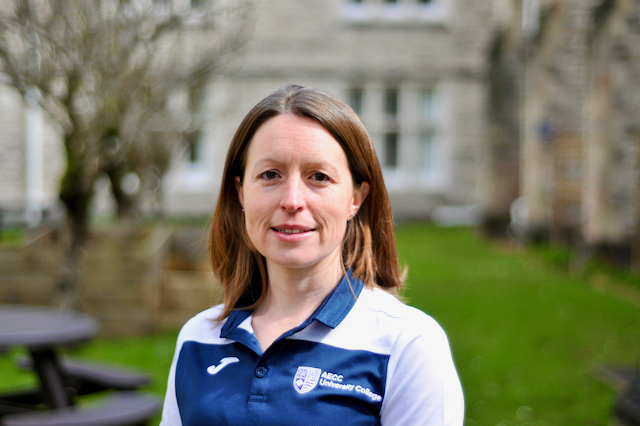
Course Leader
Michelle Evans
Lecturer in Sport and Exercise Rehabilitation
Michelle joined Health Sciences University as a Lecturer in Sport and Exercise Rehabilitation, teaching on the MSc Sport Rehabilitation and Therapy and MSc Sport and Exercise Rehabilitation courses.
Full bioEntry Requirements
What qualifications do I need? 
What qualifications do I need?
Normally a first or second-class (2:1 or 2:2) Honours degree or professional experience in the area of study. Examples of degree subject areas accepted are: Sport and Exercise Science; Strength and Conditioning; Sports Coaching Sports Science; Sports Therapy; Physical Education; Physiotherapy and Health and Physical Activity. Other degree subjects may still be considered.
Is there anything else that is required? 
Is there anything else that is required?
If you live in the UK, and undertake a placement, we will need a satisfactory Disclosure and Barring Service (Enhanced DBS) check. We will guide you through this process if required.
If you’re not sure about anything listed here, talk to our Admissions team on the form below or call us on 01202 436200 and we’ll be happy to answer any questions you have.
How do I apply? 
How do I apply?
Applications for this course will open in February.
For general questions on MSc Sport Rehabilitation and Therapy (pre-registration) entry requirements or to register your interest in the course please use the contact form below.
International Students 
Please note to be accepted onto this course; you will also need to demonstrate that you meet the minimum standards of English. You’ll need a minimum IELTS (academic) overall score of 6.0 with no less than 5.5 in each section.
Students from outside the EEA (European Economic Area) requiring a Tier 4 (General) student visa to undertake this course should note that Health Sciences University is not able to sponsor them for a part-time study mode, and will therefore not be able to consider them for a place of study.
If your qualification is not listed here, please take a look at our international entry requirements page or get in touch with our admissions team on the form below. Please note, to be accepted onto this course; you will also need to demonstrate that you meet the minimum standards of English. For further information on English language requirements, please see the dedicated English language requirements page. More information on permission to study in the UK, can be found on our Visas and Immigration page.
For more information about our admissions policies and procedures, including our Admissions Complaints and Appeals Policy, see latest policies.
For general questions on the MSc Sport Rehabilitation and Therapy (Pre-registration) qualification or to register your interest in the course, please use the contact form below.
Still have questions about applying?
Course Fees
Our current course costs for the MSc Sport Rehabilitation and Therapy course are shown below.
Home/ROI/Channel Islands
2024/25
- £8,619. These are the fees for the full MSc (180 credits)
- £479 (Per 10 credit)
2025/26
- £9,045 These are the fees for the full MSc (180 credits)
- £502.50 (Per 10 credit)
International
2024/25
- £16,419. These are the fees for the full MSc (180 credits)
- £912 (Per 10 Credit)
2025/26
- £17,226 These are the fees for the full MSc (180 credits)
- £957 (Per 10 Credit)
International students will be required to pay a non-refundable £1,000 tuition fee deposit to secure their place on the course. These deposits will need to be paid by August 31st 2024 and more details will be provided in your offer email. Further details about how to make this payment can be found on our Fees and Funding Information page.
Please note: These fees are for the 2024-25 & 2025-26 academic year only and may be subject to increase in subsequent years of study. Any increase will be in line with our Tuition Fees Policy but will not be more than 5%.
Note: For students to be eligible for funding from Student Finance England, they must be studying on an eligible course at a provider registered with the Office for Students (OfS). Health Sciences University is registered with the OfS. You can view the register and search for our name.
For more information about our admissions policies and procedures, including our Admissions Complaints and Appeals Policy, see latest policies.
Additional Course Costs
UK-domiciled applicants are required to undergo an Enhanced Disclosure and Barring Service (DBS) check. Further information will be sent to those who accept our offer. Applicants must meet the costs of this check (£48.95 in 2024). Students from low-income backgrounds eligible for bursary support from the HSU may be able to have this funded.
For more information see Additional Costs page.
Register your Interest
Register your Interest / Enquiry 
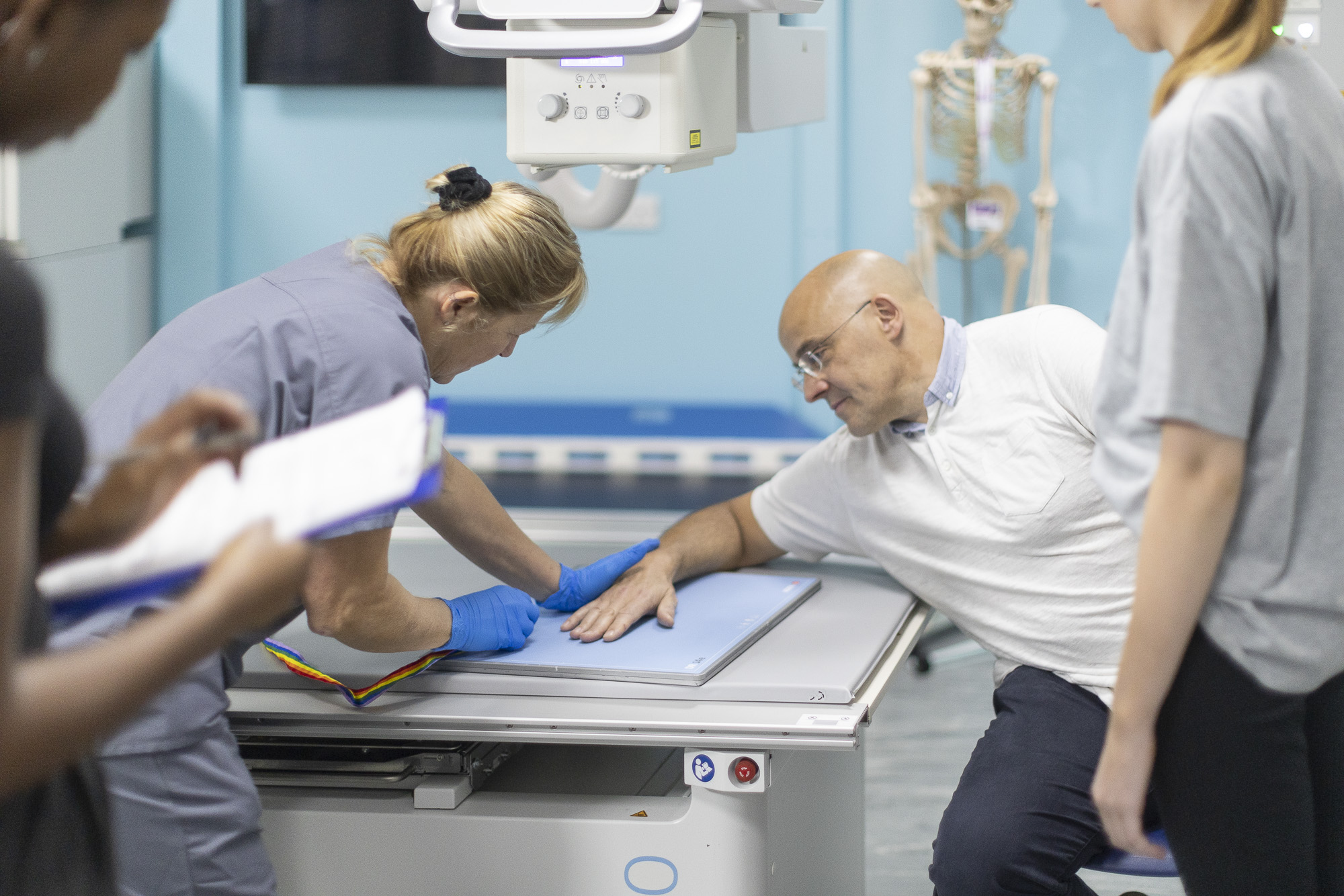
Why choose Health Sciences University
There are many benefits to studying at Health Sciences University, from our expertise and history in teaching health sciences, to our state-of-the-art facilities, on-site clinical training, and of course our location on the beautiful Bournemouth coast.
